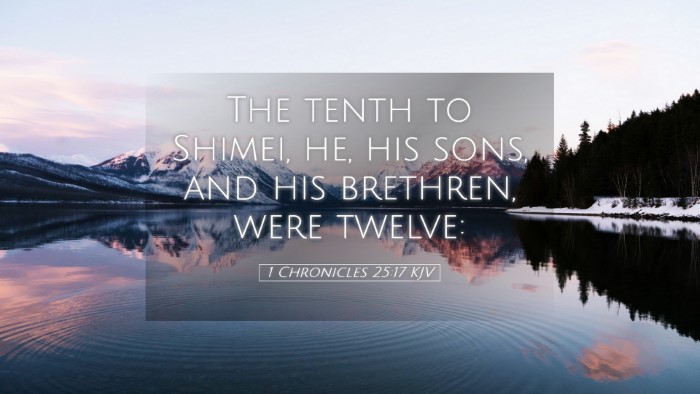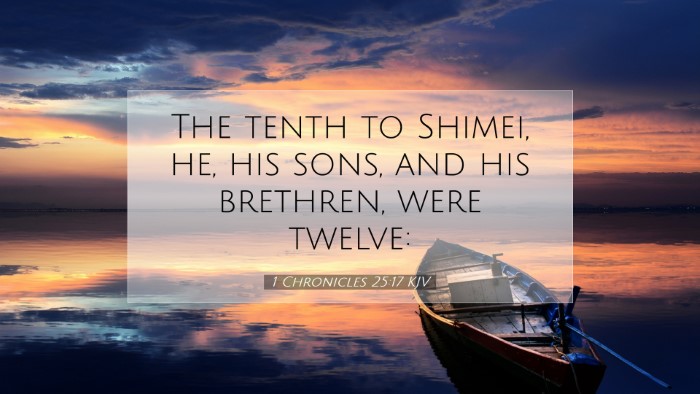Commentary on 1 Chronicles 25:17
Verse Context: 1 Chronicles 25:17 states, "The eighth to Jeshaiah, he and his sons and his brethren, were twelve." This verse is part of the genealogical records that outline the divisions of the musicians and their assignments during the reign of David.
Overview of 1 Chronicles 25
The entire chapter of 1 Chronicles 25 is dedicated to the organization of the Levitical musicians. King David, under divine inspiration, arranged for the worship in the temple, which would become a significant part of Israel's religious life. The divisions of the musicians, including their families and the assignments, reflect the structure and order that were to characterize worship.
Insights from Public Domain Commentaries
Matthew Henry's Commentary
Matthew Henry highlights the importance of the role of music in worship, stating that these musicians were not simply tasked with entertainment but with spiritual functions that uplifted the congregation. He emphasizes that the divisions of the musicians underscore a systematic approach to worship, ensuring that there was a structured manner in which praise was offered to God.
Henry points out that Jeshaiah was responsible for a significant number of singers, demonstrating the value placed on praise as integral to worship. Judging by the careful arrangement of names and assignments, it becomes evident that God desires order, even in praise, which reveals the sacredness and seriousness of worship activities.
Albert Barnes' Notes on the Bible
Albert Barnes interprets the list of singers as indicative of the importance placed on music in the Israelite worship. He notes that music was an essential vehicle for expressing devotion to God. Barnes observes that the mention of numbers, such as "twelve," was not merely historical; it symbolizes completeness and divine order, reiterating how worship should be comprehensive and organized.
Further, Barnes comments on the role of each group of musicians, linking it to the broader theme of unity and teamwork in worship. Each family unit's assignment to different musical roles serves as a metaphor for the body of Christ, emphasizing that each member has a specific function and part to play in the collective worship and glorification of God.
Adam Clarke's Commentary
Adam Clarke offers a detailed analysis of the number "twelve" mentioned in this verse, connecting it to the twelve tribes of Israel. He indicates that the Levitical musicians were a vital part of the worship system that helped to maintain the covenant relationship between Israel and God. This enhances the understanding that the organization of musicians affirms the community’s identity woven through worship practices.
Clarke also stresses the notion that every individual mentioned, including Jeshaiah and his family, plays a role in the sacred music ministry, asserting that worship is both personal and communal. He elucidates how this structure foreshadows the New Testament concept where all believers are called to be worshippers, resonating with the command to "sing unto the Lord a new song."
Theological Significance
This verse and its context present several theological meanings for pastors and scholars to ponder:
- Divine Order in Worship: The careful organization of musicians reflects God's nature and His desire for orderliness in worship settings.
- The Role of Music in Worship: Music serves as a conduit for expression, reflection, and communion with God, highlighting its indispensable role in spiritual life.
- Community and Individual Responsibility: Each musician represents a family contribution, teaching that worship involves both collective identity and individual commitment to God’s service.
- Anticipation of the New Covenant: The structured music ministry presages the vibrant communal worship found in the Christian church, serving as a blueprint for how worship can evolve through ages, maintaining its core essence.
Conclusion
The study of 1 Chronicles 25:17 reveals profound insights into the nature of worship and the importance of music in the life of the community of believers. The verses serve as a reminder that worship is both an ordered function and a spontaneous expression driven by the hearts of the faithful. Thus, modern practitioners of worship should draw from these insights, striving to embrace both order and authenticity as they lead congregations in uplifting praise to God.


